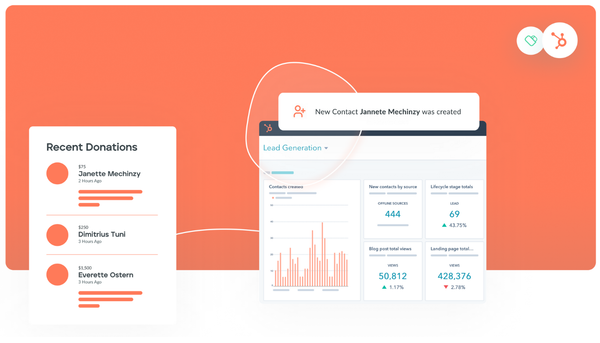Donation Receipts and Compliance: What Nonprofits Need to Know
Donation receipts are essential for legal compliance and maximizing tax benefits. This article covers everything from what to include to best practices for issuing and tracking receipts efficiently.

Ever wonder why a few short sentences on a donation receipt matter so much? Behind every successful nonprofit lies a trail of properly documented generosity. Donation receipts do far more than just say "thanks"—they're powerful tools that protect your organization legally while helping your donors maximize their tax benefits.
The benefits of donation receipts extend beyond simple record-keeping—they build donor confidence, streamline your tax reporting, and create a professional impression. Whether you're a new nonprofit or looking to improve your processes, you need to understand the ins and outs of donation receipts and compliance.
What Are Donation Receipts?
Donation receipts are official documents that record contributions made to your nonprofit organization. Typically, when someone mentions this term, they’re talking about a 501(c)(3) donation receipt, which confirms a donor's tax-deductible contribution to a registered nonprofit organization.
There are many uses for donation receipts, but the biggest one is donor communication. Many donors expect them not just as a courtesy but because they need to document their donations come tax season. The tax donation receipt acts as proof of their charitable giving and helps them maximize the potential tax benefits.
In-Kind vs. Monetary Donation Receipts
There are two types of charitable donation receipts: In-kind donations come as goods or services instead of cash, such as clothing, furniture, professional services, or venue space. Gifts of goods have a dollar value and are tax-deductible, so you should provide a donation receipt for tax purposes.
However, under Internal Revenue Service (IRS) rules, gifts of time and service don’t have a dollar value and are not tax-deductible. Nonprofits typically don’t provide receipts for these types of donations.
When Is a Donation Receipt Required?
IRS rules outline when nonprofits must provide donation receipts: For any single contribution of $250 or more, you must give a written receipt. But as mentioned above, you don’t need to provide a receipt for time or services donated.
Providing receipts for smaller donations also represents good practice since donors may need them for tax deductions. In fact, many tax professionals advise clients to keep all charity receipts for taxes, regardless of amount.
What Should Be Included in a Donation Receipt?
Proper donation receipts help donors claim tax benefits and keep your organization compliant with tax regulations. According to the IRS, nonprofit donation receipts for cash contributions must include:
- Your organization's name
- Cash contribution amount
- A statement that no goods or services were provided in exchange for the contribution, if that's the case
- If your organization provided goods or services in return, a description and good faith estimate of their value
- If your organization provided goods or services in return that had intangible religious value, a statement as such
For in-kind donations, the donor (not your nonprofit) determines the monetary value of their contribution and reports it on Form 8283, so the receipt doesn't need to state a dollar amount. An in-kind donation receipt should include:
- Your organization's name
- Donor's name and contact information
- A detailed description of the donated item(s), but not the value
- The date the gift was received
- A statement that no goods or services were provided in exchange (if applicable)
Can I Create My Own Charitable Donation Receipt?
Yes, you can create your own donation receipts as long as they include all the elements required by the IRS. However, using donation software offers major advantages, including automatic generation of compliant receipts, tracking donation history, and sending receipts right after a donation is made. These tools cut down on errors, save time, and create a more professional experience for your donors.
How to Issue Tax-Deductible Donation Receipts
Creating and sending receipts for non-profit organization donations helps you maintain good relationships with your supporters and stay compliant with the IRS. Here are some best practices to follow.
Send Receipts Promptly
Try to send donation receipts within 48 hours after receiving a contribution. Quick responses give donors immediate documentation and show them you value their support. Many donation platforms, including Donately, have automated systems to send digital receipts for online donations.
Keep Digital and Physical Copies
Store copies of all donation receipts in both digital and physical formats when possible. Digital backup protects your records even if physical documents get damaged or lost. Your system should make finding specific receipts easy when needed, which helps during audits or when donors ask for replacements. The IRS recommends keeping donation records for at least seven years, so a reliable storage system is essential.
Use Clear, Consistent Receipt Templates
Design standardized donation receipt templates to maintain consistency and compliance. Your template should feature your nonprofit's logo, contact information, and all required IRS elements in a clean, readable format. Good donation templates save time, reduce errors, and give your donors a professional impression. This is another area where a donation platform or nonprofit accounting software can help.
Track Receipts in a Donor Management System
Nonprofit donation receipts aren’t just for donors. Your organization also needs them for its own financial reporting. Recording all your receipts in a donor management system or platform not only helps with compliance, but allows you to monitor giving patterns, follow up with donors, and optimize your fundraising campaigns. An integrated system like Donately can streamline the overall donation process from initial gift to final reporting.
Automate and Simplify Donation Receipts for Nonprofits
Creating compliant donation receipts matters for both your nonprofit's legal standing and your donors' satisfaction. Following IRS guidelines helps you build trust with supporters and avoid potential problems during audits or tax season.
Donately makes this process simple. Our platform automatically sends a thank you email or donation receipt to each donor that includes the donation amount and provides tax-related information for deduction purposes. Each receipt includes the donation amount, campaign details, donor information, and details about your organization. You can customize our donation receipts with your logo, a simple message, and other options.
Beyond charitable donation receipts, Donately provides tools for analytics so you can gain valuable insights into your donors and donation data right from your dashboard. At a glance, you'll see your most active donors, popular donation amounts, and how effective your campaigns are, allowing you to optimize your online fundraising efforts.
Ready to simplify your donation receipt process? Sign up for a free account and get started.





